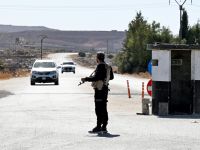U.S. President George Bush and Egyptian President Hosni Mubarak searched Tuesday for solutions to the growing violence in the Middle East, with Bush stressing the need to halt Palestinian attacks on Israelis while Mubarak demanded that Israel ease up on the Palestinians.
Bush said peace in the Middle East is "only possible if there is a maximum effort to end violence throughout the region, starting with Palestinian efforts to stop attacks on Israelis."
Mubarak, for his part, called for an end to forceful Israeli military tactics such as demolishing Palestinian houses and blocking roads.
"Nothing can be achieved through violence or resolved by force," the Egyptian said.
Bush also spoke favorably of a Saudi Arabian proposal, which would offer Israel peace, trade and security in exchange for the land the Arabs lost in war, and of Mubarak's offer to be the host for talks between Palestinian leader Yasser Arafat and Ariel Sharon, Israel's prime minister.
According to AP, Bush praised the Saudi "vision" of peace and said he supports those who "are trying to look at what it means." "We're both determined to redouble our efforts to work for peace," Bush said, referring to himself and the Egyptian president.
Mubarak said of the Israelis, "The closure of roads, the siege of towns and villages, the demolition of houses, the collective punishment that make progress more difficult should stop."
Speaking of the spiraling violence, Bush commented officials in both the United States and Egypt "view this situation with great alarm." "We both feel deep sympathy for the people in the region who are trying to live their lives in peace," he said.
In a speech before he met with Bush, Mubarak said the United States and Israel must deal with Arafat as the leader of the Palestinian people. "It is a great mistake to think otherwise," he said. "I have no problems with the Palestinians or the Israelis," Mubarak said, as he sought to put Egypt forward as an evenhanded mediator between the two sides.
Mubarak said in his speech the aim of peace talks should be to "end the injustice of all the peoples" in the Middle East. Elaborating, he said the result of the forced occupation of land had been to deny "an entire people its right to a nation."
"Occupation must end," the Egyptian president said to some 1,000 people invited by the private Council on Foreign Relations and the Middle East Institute, a research group. "Palestinians must have their rights. We want an end to the cycle of injustice." (Albawaba.com)
© 2002 Al Bawaba (www.albawaba.com)







